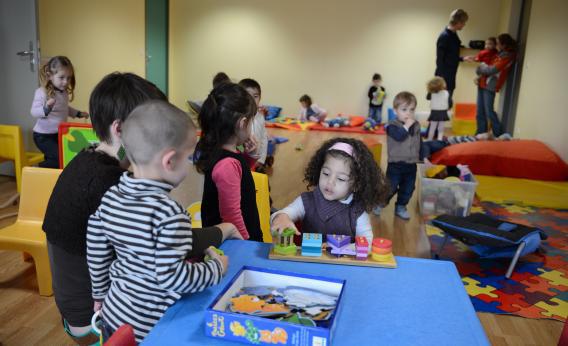Only 10 percent of children receive “high quality” day care, says the National Institute of Child Health Development. The median yearly salary for day care workers is less than $20,000. Day care is more expensive than rent for families in 22 states. These are the depressing—but not shocking—statistics writer Jonathan Cohn outlines in his sobering, often heartbreaking, New Republic piece, “The Hell of American Day Care.” They’re not shocking to any nonmillionaire parent of a small child in the United States. They’re heartbreaking, not just because of the deaths that result from sub-par day care, which Cohn discusses in horrifying detail, but also because of the less flashy, less immediately apparent problems that result when infants and toddlers don’t get the attention they need.
Last week, the New York Times published a blog post that has been on the most emailed list for several days now. It’s called “The Power of Talking to Your Baby.” In that piece, Pulitzer Prize winning writer Tina Rosenberg discusses the yawning gap that grows between poor and middle-class kids when it comes to learning. Part of that gap can be explained by the fact that “By age 3, a poor child would have heard 30 million fewer words in his home environment than a child from a professional family,” according to Rosenberg. The solutions Rosenberg talks about in her piece mostly involve trying to get parents to talk to their children more. But Cohn’s post reveals another layer: If poor children were given high-quality childcare from the time they were, say, 6 months old, that could be another way to close the language gap.
The big question in these stories about the failure of American day care is always the same: Who is going to pay for improved day care for poor children? And the same lament is always made: Why can’t we be more like France? It’s always France, held up as the glittering global example of a country that has excellent government sponsored childcare. As Claire Lundberg pointed out in Slate just a few months ago, “the French government provides: 1) inexpensive municipal day care, 2) tax breaks for families employing in-home child care workers, and 3) universal free preschool beginning at age 3.” The French also pay their child care workers quite well, and according to Lundberg, at least half of crèche workers have to have a specialized diploma in early childhood development.
Like many writers before him, Cohn uses France as an aspirational model of childcare. He talks about Obama’s plan to put forth a universal pre-kindergarten proposal, which would cost $75 billion over ten years and be funded by higher cigarette taxes. Republicans will certainly oppose this, as they do most anything that involves higher taxes. And that still doesn’t help parents of children who are under the age of 3.
Writing in the American Prospect in 2000 (which shows how little progress we’ve made on this front in the past decade plus), Victor Fuchs outlines a proposal to make American childcare more French—one that would not cost parents any more money. He recommends increasing the child-to-worker ratio. The French ratio of children to workers is nearly twice that of their American day care counterparts, which means that a French day care program with the same number of children as an American one pays each of its workers more.
And this makes a real difference, Fuchs argues. Part of the reason American childcare is not great, he says, is because wages are so poor for day care workers; the turnover is tremendous. “Failing a change in the child/worker ratio, child-care wages are likely to stay at their extremely low levels,” Fuchs writes. “If they do, the education and work experience of the child care workers will remain low, and the turnover rates in this occupation will continue to be high.” It’s probably not a cure-all, but as the New Republic amply proves, Americans are desperate for any solutions to this potentially devastating problem.
